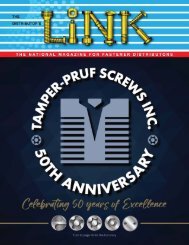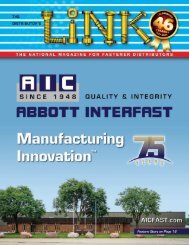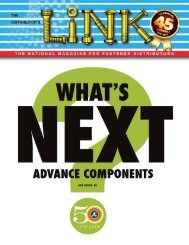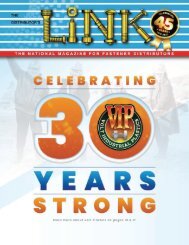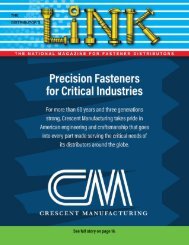WINTER 2021
Distributor's Link Magazine Fall 2020 / Vol 44 No 1
Distributor's Link Magazine Fall 2020 / Vol 44 No 1
Create successful ePaper yourself
Turn your PDF publications into a flip-book with our unique Google optimized e-Paper software.
76<br />
THE DISTRIBUTOR’S LINK<br />
Roman Basi<br />
Roman Basi is the President of The Center for Financial, Legal & Tax Planning, Inc. Roman<br />
graduated from Milliken University obtaining a Bachelor’s of Science Degree with a minor<br />
in Psychology. He earned an MBA from Southern Illinois University with an emphasis<br />
in Accounting and recevied his JD degree from Southern Illinois University. Roman is a<br />
licensed CPA as well as being a licensed attorney in Illinois, Missouri and Florida and is<br />
in high demand for his expertise in financial, legal and tax matters. His areas of expertise<br />
include mergers and acquisitions, contracts, real estate law, tax and estate planning.<br />
RECENT DEVELOPMENTS AND GUIDELINES<br />
FOR PPP LOANS FROM THE SBA<br />
Over the course of the first half of October, the SBA<br />
has released three new guidelines addressing some of the<br />
most frequently asked questions regarding PPP loans. For<br />
those of you that are unaware, PPP (Paycheck Protection<br />
Program) loans were provided to small businesses as a<br />
response to the economic losses due to COVID-related<br />
shutdowns. PPP borrowers can qualify to have the loans<br />
forgiven if the proceeds are used to pay certain eligible<br />
costs. On August 8, 2020, the program stopped accepting<br />
new applications even though almost $134 billion of<br />
congressionally approved funds remained unspent. Now,<br />
most businesses are focusing on applying for forgiveness,<br />
which is all but guaranteed so long as 60% of the forgiven<br />
amount was used for payroll purposes.<br />
On October 5, 2020, the SBA announced new<br />
guidance that described the procedures requiring a change<br />
of ownership of an entity that has received PPP funds.<br />
The SBA procedural notice, which was addressed to SBA<br />
employers and PPP lenders, described when a change in<br />
ownership has occurred and the duties of a PPP borrower<br />
continue regardless of the ownership change. According to<br />
the notice, a “change of ownership” occurs when one of<br />
the following is true: 1) at least 20% of the common stock<br />
or ownership interest of a PPP borrower is sold or otherwise<br />
transferred; 2) the PPP borrower sells or otherwise<br />
transfers at least 50% of its assets to be measured by<br />
fair market value; or 3) a PPP borrower is merged with<br />
another entity. Notwithstanding any ownership change,<br />
the PPP borrower still remains responsible for performance<br />
of all obligations under the PPP loan, certifications<br />
associates with the PPP loan application, compliance with<br />
all PPP requirements, PPP documentation, and providing<br />
the required documentation to the SBA or lender upon<br />
request. The SBA must be notified within five (5) days<br />
CONTRIBUTOR ARTICLE<br />
of any transaction by the PPP lender. The lender is also<br />
required to continue submitting the monthly 1502 reports<br />
until the PPP loan is fully satisfied.<br />
On October 7, 2020, the SBA released guidance<br />
clarifying the deferral period for PPP loan payments.<br />
Prior to the passage of Paycheck Protection Program<br />
Flexibility Act of 2020, the deferral period for PPP loan<br />
payments was set at 6 months. However, the Flexibility<br />
Act extended the deferral period for borrower payments of<br />
principal, interest, and fees on all PPP loans to the date<br />
that SBA remits the borrower’s loan forgiveness amount<br />
to the lender (or, if the borrower does not apply for loan<br />
forgiveness, 10 months after the end of the borrower’s<br />
loan forgiveness covered period). Under the updated<br />
guidance, PPP lenders are required to give immediate<br />
effect to the statutory extension and must notify all<br />
borrowers of the change.<br />
On October 9, 2020, the SBA released an interim<br />
final rule (IFR) that provided almost instant relief for<br />
approximately 3.57 million businesses. If their PPP<br />
loan was for $50,000 or less, businesses are exempt<br />
from any reductions in forgiveness based on either:<br />
reductions in full-time equivalent employees or reductions<br />
in employee salaries or wages. Small businesses that fit<br />
in this category may apply for forgiveness using SBA Form<br />
3508S. The new rule speeds up the forgiveness process<br />
for PPP borrowers of $50,000 or less because they will<br />
not be required to perform potentially complicated FTE or<br />
salary reduction calculations. Because most businesses<br />
would hire an outside source to do this work, they are now<br />
also more likely to save money on this portion as well.<br />
Borrowers of $50,000 or less will still have to make some<br />
certifications and provide documentation to the lender for<br />
payroll and nonpayroll costs.<br />
CONTINUED ON PAGE 150





